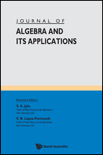
JOURNAL OF ALGEBRA AND ITS APPLICATIONS
Scope & Guideline
Connecting Theory to Practice in Algebraic Research
Introduction
Aims and Scopes
- Algebraic Structures and Their Properties:
The journal covers a wide range of algebraic structures such as groups, rings, algebras, and modules, exploring their properties, representations, and interrelations. - Homological Algebra and Cohomology:
Research involving homological dimensions, cohomological properties, and derived categories is a significant focus, emphasizing the relationships between algebraic structures. - Applications of Algebra in Other Disciplines:
The journal encourages submissions that apply algebraic concepts to areas such as coding theory, cryptography, and combinatorial designs, demonstrating the utility of algebra in solving real-world problems. - Non-commutative Algebra:
A substantial portion of the journal's content is dedicated to non-commutative algebra, including studies of Lie algebras, Hopf algebras, and related structures. - Computational Algebra:
The journal also highlights computational methods in algebra, including algorithms for algebraic structures, applications of computer algebra systems, and combinatorial techniques.
Trending and Emerging
- Algebraic Geometry and Commutative Algebra:
Recent publications indicate a growing interest in the interplay between algebraic geometry and commutative algebra, with a focus on ideals, varieties, and their properties. - Homotopy Theory and Higher Algebra:
There is an increasing trend towards the exploration of higher algebra concepts, including homotopy theory and derived categories, reflecting a broader mathematical interest in categorical and topological methods. - Quantum Groups and Noncommutative Geometry:
Research in quantum groups and noncommutative geometric structures is on the rise, showcasing a shift towards modern algebraic theories that integrate physics and advanced algebra. - Computational Techniques in Algebra:
The application of computational methods and algorithms in algebra is increasingly highlighted, driven by the need for practical approaches to complex algebraic problems. - Lie Theory and Related Algebras:
There has been a notable increase in studies related to Lie algebras, superalgebras, and their applications, indicating a resurgence of interest in these areas.
Declining or Waning
- Classical Group Theory:
While still relevant, classical group theory has seen a decline in focus, with fewer papers dedicated to traditional topics such as finite groups and their properties, as newer algebraic structures gain prominence. - Basic Ring Theory:
Research centered on basic ring theory, including studies of commutative and integral domains, appears to be less frequent, possibly due to the rise of more complex algebraic structures and their applications. - Elementary Algebraic Structures:
Topics covering elementary aspects of algebraic structures, such as basic properties of modules or simple algebraic operations, are becoming less common as researchers delve into more advanced and abstract concepts.
Similar Journals

Forum of Mathematics Sigma
Fostering collaboration in the world of mathematics.Forum of Mathematics Sigma is a premier open access journal published by Cambridge University Press that has been at the forefront of mathematical research since its inception in 2013. With a strong emphasis on advancing the fields of mathematics, the journal consistently achieves Q1 rankings across multiple categories, including Algebra and Number Theory, Analysis, and Computational Mathematics. This distinction highlights its impact and relevance within the scholarly community. The journal prides itself on providing a platform for innovative research, fostering collaboration among researchers and practitioners across various mathematical disciplines. Open access publication ensures that cutting-edge findings are widely available to readers globally, enhancing the dissemination of knowledge. With an address in the heart of Cambridge, England, Forum of Mathematics Sigma is dedicated to promoting high-quality research and making significant contributions to the development of mathematics.
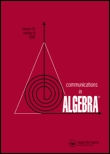
COMMUNICATIONS IN ALGEBRA
Elevating Algebra: A Platform for Groundbreaking Research.COMMUNICATIONS IN ALGEBRA is a prestigious academic journal dedicated to advancing the field of algebra and number theory. Published by Taylor & Francis Inc, this influential journal has been in circulation since its inception in 1974 and continues to provide a platform for innovative research through 2024. With an ISSN of 0092-7872 and an E-ISSN of 1532-4125, it serves a global community of researchers, professionals, and students who are passionate about algebraic studies. The journal is currently ranked in the Q2 category in Algebra and Number Theory for 2023, showcasing its strong impact and relevance within the academic community, as reflected in its Scopus rank of #60 out of 119 and a 50th percentile standing. COMMUNICATIONS IN ALGEBRA aims to publish high-quality, peer-reviewed research articles that not only address current issues in the field but also pave the way for future exploration, solidifying its role as a cornerstone of mathematical literature.
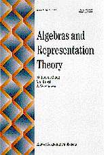
ALGEBRAS AND REPRESENTATION THEORY
Illuminating the Path of Representation TheoryALGEBRAS AND REPRESENTATION THEORY, published by SPRINGER, is a premier journal that focuses on the cutting-edge developments in the field of algebra and representation theory. With an ISSN of 1386-923X and an E-ISSN of 1572-9079, this journal has fostered a robust platform for both established and emerging researchers since its inception in 1998. As a Q1 journal in the Mathematics miscellaneous category for 2023, it stands out for its rigorous peer-review process and commitment to academic excellence. Although it is not an open-access journal, its broad scope includes significant theoretical advancements and applications that resonate across various mathematical disciplines. Located at VAN GODEWIJCKSTRAAT 30, 3311 GZ DORDRECHT, NETHERLANDS, ALGEBRAS AND REPRESENTATION THEORY continues to contribute meaningfully to the scientific community by providing researchers with essential insights and fostering collaboration in the increasingly complex landscape of mathematics. Researchers, professionals, and students are encouraged to engage with the latest publications, as the journal plays a critical role in shaping contemporary discussions and innovations in the study of algebraic structures.
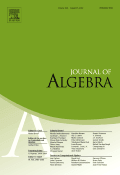
JOURNAL OF ALGEBRA
Fostering Excellence in Algebraic ResearchThe JOURNAL OF ALGEBRA, published by Academic Press Inc. Elsevier Science, is a premier scholarly outlet dedicated to the field of algebra and number theory. With its impressive Q1 ranking in the 2023 category of Algebra and Number Theory and a solid Scopus rank of #46 out of 119, it stands as a crucial resource for researchers and professionals seeking to deepen their understanding of advanced algebraic concepts. Operating since 1964 and continuing through 2025, the journal boasts a rich history of publishing influential research that drives the discipline forward. While the journal does not currently offer open access options, it remains committed to providing high-quality peer-reviewed content to the academic community. Its comprehensive archive and cutting-edge research articles serve as essential tools for students, researchers, and practitioners aiming to stay at the forefront of algebraic studies.

International Electronic Journal of Algebra
Exploring the Depths of Algebra and Number TheoryThe International Electronic Journal of Algebra (IEJA) is a premier open-access platform dedicated to advancing research in the field of algebra and number theory. Established in Turkey and published by IEJA-INT ELECTRONIC JOURNAL ALGEBRA, this journal has been providing unrestricted access to high-quality scholarly articles since 2007, facilitating the dissemination of valuable findings and innovative methodologies to a global audience. With an ISSN of 1306-6048 and a notable Scopus rank of 85 out of 119 in its category, IEJA contributes significantly to the mathematical community, evidenced by its Q3 quartile ranking in Algebra and Number Theory as of 2023. Researchers, professionals, and students can engage with a diverse range of topics in algebra, enhancing both theoretical understanding and practical applications in this vital area of mathematics. As a journal committed to fostering collaboration and progress, IEJA stands out as an essential resource for anyone seeking to contribute to and learn from the evolving discourse in algebra.

Journal of Commutative Algebra
Navigating the Landscape of Algebraic TheoriesThe Journal of Commutative Algebra, published by the Rocky Mountain Mathematics Consortium, stands as a pivotal resource in the realm of algebra and number theory. With an ISSN of 1939-0807 and E-ISSN 1939-2346, this journal has been at the forefront of advancing scholarly research since its inception in 2009. As a Q3 category journal in the 2023 rankings, it maintains an essential position within its field, ranking 88th out of 119 in Scopus for Mathematics - Algebra and Number Theory, placing it within the 26th percentile. The Journal aims to disseminate high-quality research that spans various aspects of commutative algebra, serving as a crucial platform for academicians, professionals, and students alike. Readers interested in the evolving landscape of algebraic theories and applications will find this journal's contributions invaluable for their research and professional development.

New York Journal of Mathematics
Elevating mathematics through groundbreaking research.New York Journal of Mathematics is a prominent open-access journal, published by the ELECTRONIC JOURNALS PROJECT, dedicated to advancing the field of mathematics through the dissemination of groundbreaking research. Since its inception in 1996, the journal has evolved into a valuable resource for researchers, educators, and students, particularly in the realm of general mathematics. As of 2023, it proudly holds a Q2 classification in the Mathematics (miscellaneous) category, reflecting its growing impact and reach within the academic community, despite being ranked at the 31st percentile overall. With its commitment to open access since 2022, the journal ensures that high-quality mathematical research is readily available to a global audience, fostering collaboration and innovation. Researchers interested in contributing to this dynamic field will find the journal a vital platform for sharing their findings and engaging with fellow mathematicians around the world.

ALGEBRA UNIVERSALIS
Elevating Logic through Rigorous ScholarshipALGEBRA UNIVERSALIS is a prestigious academic journal published by Springer Basel AG, dedicated to the exploration and advancement of mathematical research, particularly within the realms of algebra, number theory, and logic. Established in 1971, this journal continues to provide a platform for innovative research and discourse, contributing significantly to its fields of study over more than five decades. With its current classification in the Q2 quartile for both Algebra and Number Theory and Logic, ALGEBRA UNIVERSALIS ranks prominently within the mathematical community. Although it is not an open-access journal, it offers numerous subscription options for individuals and institutions seeking to stay current with the latest developments and findings. The journal’s commitment to quality research makes it an essential resource for researchers, professionals, and students aiming to deepen their understanding and knowledge of advanced mathematical theories and methodologies.

MICHIGAN MATHEMATICAL JOURNAL
Advancing Mathematical Frontiers with Rigorous ResearchThe MICHIGAN MATHEMATICAL JOURNAL is a prestigious and influential publication in the field of mathematics, founded by the University of Michigan. With an ISSN of 0026-2285 and an E-ISSN of 1945-2365, this journal is recognized for its high-quality research and has achieved a commendable Q1 ranking in the category of Mathematics (miscellaneous) as of 2023. Published by the esteemed Michigan Mathematical Journal, it provides a platform for the dissemination of innovative mathematical theories and findings, playing a crucial role in advancing knowledge and scholarship within the mathematical community. With coverage spanning from 1996 to 2024, the journal emphasizes rigorous theoretical development and fosters collaboration among researchers, professionals, and students alike. While not an open-access journal, its contributions are invaluable for those looking to stay abreast of cutting-edge mathematical research.
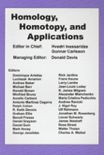
Homology Homotopy and Applications
Bridging Theory and Practice in Algebraic MathematicsHomology Homotopy and Applications is a prestigious peer-reviewed journal published by INT PRESS BOSTON, INC, dedicated to advancing the field of mathematics, particularly within the realms of algebraic topology, homological algebra, and their applications. With an impressive Q1 classification in the mathematics category for the year 2023, this journal serves as a crucial platform for researchers, professionals, and students aiming to disseminate their findings in a rapidly evolving discipline. Although open access options are not currently available, the journal retains significant value with its rigorous selection process and high-impact studies. The journal invites submissions that explore theoretical developments as well as practical applications that bridge homology and homotopy theories, thus contributing to the broader scientific community from its base in the United States. With convergence covering years from 2001 to 2024, Homology Homotopy and Applications continues to be a vital resource for fresh insights and groundbreaking research in mathematical sciences.